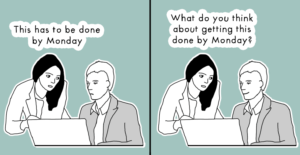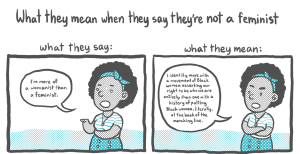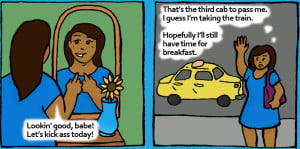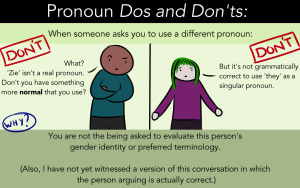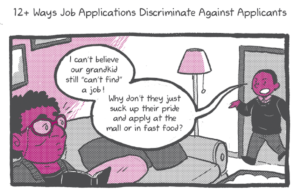Over the past three months, I’ve drifted between five different countries – all while maintaining a fulfilling relationship and job.
Sound too good to be true? I thought so, too.
And that’s one big lie society teaches us.
When we’re growing up, our parents, teachers, relatives, and friends may tell us we can be whatever we want, but they generally have a few basic expectations.
One is that we’ll get married and have kids. Another is that we’ll “settle down” in some place or another. If not in a house with a white picket fence, then at least in a progressively nicer apartment.
My family and friends are very open-minded people, but they’ve had trouble wrapping their heads around the fact that I won’t meet these expectations.
When I moved to San Francisco in 2014, my parents said maybe they’d move there, too, if that’s where I “settled.” Then, when I moved to New York, they wondered what was wrong with San Francisco, as if leaving meant going there was a mistake. As if every move was a process of figuring out where I wanted to “end up.”
The thing is, no matter where I’ve lived, I’ve always felt the itch to move. Being in a new place is exciting at first, but it gets stale after a few months.
For a while, I concluded, like my parents, that I was just living in the wrong places. But then I realized the concept of continuously living in a specific place at all didn’t resonate with me.
Ever since I started working remotely, I’d constantly couchsurfed with friends in different cities. It excited and energized me. Not the places themselves, but their newness. And, at the same time, their familiarity. The comfort of having homes all over the world.
I learned last year that there’s a name for this lifestyle: Someone who travels constantly while working remotely is called a digital nomad.
Not everybody has the privilege to do this. Many have jobs, family, and other responsibilities that tie them to a home.
And while not all digital nomads are financially privileged – for many, the lack of rent actually allows them to survive off low incomes.
And some drift from place to place within the same city because they can’t afford much travel – those of us who lead these lifestyles must acknowledge that there is a degree of privilege in finding housing.
For example, racial biases may affect someone’s choice in hiring a house sitter or letting someone crash on their couch.
In addition, cities’ and towns’ lack of planning around accessibility may prevent some sick and disabled people from finding living spaces and other critical resources, and women, LGBTQIA+ people, and other vulnerable populations may not always feel safe constantly living in new places.
Still, the digital nomads I know are very diverse, and one nomad friend of mine lives on less than $5,000/year by couchsurfing and house sitting.
There are a lot of resources online to navigate being a digital nomad with certain disadvantages.
Here’s some advice on traveling when you’re broke, here’s a guide to being a digital nomad with a disability, here are some stories from digital nomad women of color, and here are suggestions on where to avoid as a woman or minority.
Still, as a non-binary woman who suffers from anxiety, I definitely had a lot of concerns about this lifestyle myself.
I wanted to do it the moment I learned it was a thing, but just as quickly, fear after fear popped into my head.
“What will your mom think? She was so generous to help you furnish your apartment. She wouldn’t want to see all that stuff go to waste.”
“Is it even safe to travel alone?”
“You’ll worry your family sick.”
For almost a year, I pondered and pondered, blocked by these worries.
July fifth of 2016 was the deadline for me to renew my lease in New York City. On July third, I intended to do it. But on July fourth, I realized I couldn’t keep living a lifestyle I’d only lived because “everyone else” did.
I’d been learning from other digital nomads online that the life I’d been denying myself really was possible. So much more was out there than I realized.
So I threw away that lease renewal form and didn’t look back. Six months later, my fears have proved either unfounded or trivial.
I got into some compromised situations, but nothing life-threatening. People were confused, but mostly intrigued. My parents were worried, but not hostile.
And if people took it worse, it would’ve been worth it. I’ve gotten what I’ve always wanted: liberation from attachment to places.
But not everyone gets it. I get misunderstood as going through a phase, or being confused, or wanting a home, but not being able to have one.
Since feminism is all about furthering our ability to be who we uniquely are, even if society doesn’t acknowledge or approve of it, this is a feminist issue.
Over the past few decades, women, trans folks, and non-binary people – heck, people in general – have made great strides in gaining the freedom to live the lives they want.
But we’ve still hung onto this idea that we’ll plant our roots somewhere and work our way up toward the nuclear-family-with-a-golden-retriever capitalist American dream.
The female homemaker, the male breadwinner, the heterosexual marriage with biological children, the “impressive,” full-time job, and other oppressive cultural prescriptions center on the image of the home.
So, when someone doesn’t appear to be headed in that direction, people want to “help” them be more “normal.” But we don’t need help achieving someone else’s dream. We need to be empowered to live our own.
My dream is digital nomadism, and I wish more people had supported that, or at least acknowledged it as an option. I also wish the world better accommodated the needs of marginalized people to make this lifestyle more widely accessible. With the right resources, it could be available to anyone.
Even though many digital nomads experience some privileges, we’re among the people society labels as weirdos.
Here are the social norms behind the assumption that being a digital nomad isn’t desirable or viable – and why they’re completely bogus.
1. ‘Everyone’s Gotta Settle Down Someday’
Because of our heteronormative, gender-role-based, capitalist idea of how our lives should work, people expect everyone to “settle down” and for settling down to always look the same.
The ideal that everyone is assumed and expected to strive toward involves, or in some way mimics, a heterosexual, monogamous couple and their biological children all under one roof.
Our concept of home is wrapped up in our expectations for work and family, which is reflected in our language: Family members are typically expected to either be a “homemaker” or “bring home the bacon.”
That ideal might fit for some people, but we shouldn’t act like it’s objectively the right way to live.
Never getting married or having kids, living apart from your kids, having many caregivers come and go, or having a traditional family but moving around a lot, for example, are also valid options.
Due to the dismissal of these options, people have a very hard time understanding that by traveling the world, I’m not taking a break from my day-to-day life or exploring places where I may decide to live one day. This is it. Few are familiar with the concept of going somewhere, loving it, and, nevertheless, leaving.
When people are more understanding of my lifestyle, they still say things like, “This is the thing to do in your twenties, before you have any real responsibilities!”
We have this idea that eventually, once you’ve got all the youthful wanderlust out of you, you’ll “calm down” and become more of a homemaker. Again, especially if you’re a woman.
But, unless your job or responsibilities toward others demand it, there’s no reason you have to stay anywhere.
2. ‘Eventually, You’ll Want to Get Married and Have Kids’
When I press people to explain why I’ll need to settle down, it usually comes down to at least one of two things: a family or a “steady” job (more on the latter under point 3).
As I mentioned, there’s an expectation that everyone wants a spouse and kids. And women and femmes who partner with men or more masculine people in particular are subject to this expectation.
We are supposed to be “needy” in relationships, so that even before marriage enters the picture, we want constant attention from our partners. Therefore, it’s hard for some people to imagine a woman or femme who would intentionally spend a lot of time away from their partner.
Once a relationship gets serious, we’re expected to want our partners to “put a ring on it.” And then, once that happens, that “maternal instinct” supposedly kicks in, and we’ll need a good old “stable” home where we can pack our kids’ lunches and wash their clothes.
Plenty of people don’t want any of these things. And if we did, we could still have it while traveling. There are digital nomad families.
There’s no one way for a family to look. It doesn’t have to consist of two parents. The parents don’t have to be the primary caregivers. They don’t even have to all live in the same place.
When we tell people that they should stay in one place so that they can have a relationship or a family, we are implying that there’s only one way to have a family. This erases not only digital nomads, but also LGBTQIA+ parents, polyamorous parents, extended families that raise kids, and many others.
And there’s no one way for a romantic relationship to look either.
You don’t have to be attached at the hip in order to have a solid, healthy relationship. My partner and I alternate between several months living together and several months of independence – and I love that balance.
When people imply that one day, we’ll have to live in the same place for this to work, they’re imposing standards on our relationship based on other people’s preferences.
3. ‘You’ve Got to Get a Full-Time Job’
As I mentioned, the other common argument people give for staying in one place is that it’ll allow you to have a full-time job.
We’re “supposed” to want to be doctors, lawyers, stockbrokers, and other “prestigious” professionals. If we’re not one of these or on our way to becoming one of these, it’s assumed we want to be. So, if we don’t appear to even be attempting to head in that direction, people are once again confused.
A digital nomad can have any job, but we’re disportionately likely to have positions that are commonly held remotely, like startup founders and freelance writers or designers.
Many nomads I know are redefining work, with titles like “online dating consultant” and “freelance brand developer” that people can’t understand and therefore can’t assign a rung on the corporate ladder. So, being a digital nomad is sometimes considered a bad career move.
This stems from the assumption that everyone wants a job that’s considered highly respectable by mainstream society. And what kind of job is considered respectable is based on a classist system that values people based on how much money they make and how much social status they have.
Of course, having a job with health insurance, long-term potential, and a good salary is necessary for many people’s survival. But we’ve made it into more than that. We’ve made it a metric of how much someone’s worth.
So, many people still have this idea that freelancers, entrepreneurs, and artists are just salaried-worker wannabees.
People love to throw around words like “steady” and “stability,” ignoring all the people who get laid off from full-time jobs or receive inadequate salaries from them and all the other ways people make a living.
Granted, not everybody has a choice regarding what type of job they have. Some are just hoping to get a job, period, and need to take whatever they can get. Some rely on the benefits or predictable income their full-time job offers.
But remote full-time jobs do exist, and not all of us even want one. Many people have more success working for themselves because their education level, appearance, race, gender, and other factors could lead to discrimination from employers.
The ideal of the successful businessperson who goes into the office from 9-5 with a briefcase is all tied up with this white-picket-fence image imposed on us.
It’s also very much tied up with the idea that how much traditionally defined success we attain – and how much wealth our profession is stereotypically associated with, regardless of what we actually make – determines how “important” we are.
Under toxic capitalism, our value lies in how much we contribute to the economy, and only certain contributions are recognized.
In reality, I (and many other people) make great livings without full-time jobs, and lots of people with them are dissatisfied with their work situations or pay.
But furthermore, even if we were doing nothing all day or making no money, that wouldn’t mean our lives weren’t worth celebrating or that we’re less respectable people.
We’re worth more than our productivity.
4. ‘Hang on to Your Things’
Due to the way we hierarchize people based on their money, our society is very attached to things, valuing them beyond the necessary functions they fulfill.
Commercials – and the capitalist value system that govern them – teach us that shopping will bring us happiness. We see the items we possess as a marker of prestige and status.
We view money in the same way – as something to have for its own sake, even if we don’t need it – and ascribe monetary value to nearly everything.
For this reason, many people would rather keep things they don’t need than give them away for free. We’re made to feel like if we can’t get the price something’s “worth,” we’re wasting its value.
This makes us lose sight of one important fact: Something’s not valuable to you if you don’t even want it.
When I first moved out of my apartment, I made what digital nomad forums have taught me is a classic mistake: I put all my stuff in storage.
Nearly every nomad I’ve spoken to has regretted this. So why did we all do it anyway?
At least in my case, I believed it was wrong to waste all the things I had (like my beloved Ikea furniture). Yet, after donating it all, I miss nothing.
Going against the philosophy that the more things we possess, the further along we are on this American dream toward becoming a wealthy, impressive adult, I now ask people not to get me gifts. It’s just more stuff I have to worry about storing or carrying around.
I feel richer when my backpack is filled only with things that have value to me, and I view the ability to travel lightly as a gift.
5. ‘Don’t Travel Alone’
Based on the advice people give, you’d think there were an epidemic of women, femmes, and folks gendered as women getting attacked while traveling.
But while this does happen, there’s far more of an epidemic of women being assaulted and harassed in their workplaces, on their college campuses, and in their own homes.
Overall, men are actually more likely to be victims of crimes at the hands of strangers.
Yet, it’s women who are constantly warned to take their keys out early as they walk home, steer clear of the streets and night, and avoid traveling alone.
This encourages a view of women as helpless, perpetuates the myths that men can’t be crime victims, and ignores that LGBTQIA+ people are frequent targets of crimes – for reasons that have nothing to do with them.
It also furthers the misconception that we should feel safer in private places, puts blame on crime victims, and scares women out of doing things that could be great for them.
There are plenty of places that are relatively safe to travel alone, and when they’re not, we shouldn’t warn women exclusively or teach them it’s their responsibility not to be victimized.
When we do this, we perpetuate rape culture, which is actually what makes the world less safe for women.
***
Digital nomads in many ways represent a rejection of mainstream values.
Foregoing a traditional family, job, and home seems irrational to many people. After all, we’re all supposed to want that.
But through feminism, I’ve learned that even if we ourselves wouldn’t want what others do, we can still be glad they have it. People are very diverse, so lifestyles should be, too.
Instead of trying to force ourselves down a path that doesn’t suit us best, we should all have the right to celebrate who we are. And anyone who wants to see us happy should join that celebration.
[do_widget id=’text-101′]
Suzannah Weiss is a Contributing Writer for Everyday Feminism. She is a New York-based writer whose work has appeared in The Washington Post, Salon, Seventeen, BuzzFeed, The Huffington Post, Bustle, and more. She holds degrees in Gender and Sexuality Studies, Modern Culture and Media, and Cognitive Neuroscience from Brown University. You can follow her on Twitter @suzannahweiss. Read her articles here.
Search our 3000+ articles!
Read our articles about:
Our online racial justice training
Used by hundreds of universities, non-profits, and businesses.
Click to learn more







